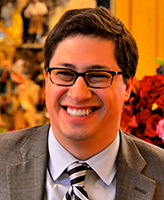
During the spring of 2012, Dr. R. Joseph Shonkwiler ’04 reached a crossroads in his career.
In a few months he would graduate with a master’s degree in public policy from Princeton University, and he needed to decide his next step. Shonkwiler could return to clinical medicine and finish his surgical residency at New York Presbyterian Hospital, or he could pursue a new career in the public policy field.
As graduation approached, he learned that U.S. Sen. Rob Portman of Ohio was looking for a new health policy advisor. Although he had no experience working on Capitol Hill, Shonkwiler decided to apply.
Portman seemed impressed not only with Shonkwiler’s medical background and public policy studies, but also his undergraduate education at Notre Dame—where Shonkwiler majored in English and Arts and Letters preprofessional studies (now called pre-health).
“You can’t be an English major unless you know how to read huge volumes of material and write effectively,” Shonkwiler says. “That was a big part of the senator knowing I could do the written work and policy work at the level they expect in the Senate.”
A New Path
Shonkwiler was offered the job and accepted it, even though it meant setting aside clinical medicine, a career he had pursued for seven years. Working on Capitol Hill gives him a close-up view of national health care issues—and the chance to help steer how the government addresses them.
“I had the ability to impact one patient at a time as a clinician, but now I have the opportunity to impact the care patients receive all over the country,” he says.
Shonkwiler also believed the position would allow him to better utilize the skills he had honed in Notre Dame’s College of Arts and Letters and that he truly loved—reading, writing, and thinking critically.
As Portman’s health policy advisor, Shonkwiler briefs the senator on all health care-related legislation. For example, when President Obama released his 2014 budget proposal in April, Shonkwiler read the entire document, including 40 pages of health policies, and distilled it into a brief summary for the senator.
“Being able to take huge volumes of material, analyze it, and give it back in a presentable form—while at the same time expressing your opinion on the material—is definitely something I developed at Notre Dame,” Shonkwiler says.
An Avid Reader
Shonkwiler grew up in a family with many physicians, and always intended to follow in their footsteps. But as an avid reader who “lived inside books,” he also wanted to pursue his love of language at Notre Dame. So he decided to study both.
“Part of what I loved about studying English and preprofessional studies is that it never limited my focus or scope,” he says. “I basically felt like I had the whole world open to me. I could do literature and poetry at the same time I was doing biology and physiology.”
After enrolling at Columbia University College of Physicians and Surgeons in 2004, he found that his English degree helped him with the heavy reading in medical school. As he began his residency four years later, he realized that his ability to communicate effectively made him a better doctor because he saw beyond numbers and statistics.
“I definitely would be a worse doctor if I had never taken poetry courses,” he says. “Reading about the human experience helps you take care of people.”
A Balanced Education
But for Shonkwiler, clinical medicine left him still searching for more. From a young age, he had always been interested in politics. Between his first and second year of medical school, he worked for the Franklin County (Ohio) Republican Party, and in 2008, he was part of Sen. John McCain’s primary campaign.
When Shonkwiler started the master’s program at Princeton in 2011, he didn’t know where it would lead, but he believed it would allow him to merge his expertise in medicine with his long-standing interest in public policy.
“I could have a broader focus that would allow me to do writing and analysis, and also not lose sight of the clinical work I had done for my medical education,” Shonkwiler says.
Still, he imagined he would likely return to his residency after graduation. But thanks to a senator who sought out an English major, Shonkwiler set out in a new direction.
“It was such a rare opportunity, that the senator was willing to take a chance on somebody with no Hill experience, I knew it was at least worth trying,” Shonkwiler says.
After nearly two years in the role, Shonkwiler feels he has found a fulfilling position that utilizes a variety of his skill sets and interests.
When he looks back at his course of study at Notre Dame, he sees the value of pairing his interest in medicine with his love of literature. Those studies allowed him to adjust his career path when the time was right.
“I found a way to bring the two together,” Shonkwiler says. “I think medicine will always be a part of my life, whether it’s health policy or doing a related job in the private sector.”
Learn More >
- Department of English
- Arts and Letters pre-health program
- Notre Dame English majors and careers in medicine
- Alumni Profiles
Originally published by at al.nd.edu on December 18, 2013.